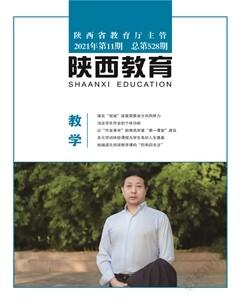核心素养下的初中英语听说课教学设计
姜晓聪
《普通高中英语课程标准》明确提出,英语学科核心素养是学生在接受相应学段英语课程教育的过程中,逐步形成和提升的适应终身发展和社会发展需要的正确价值观念、必备品格和关键能力。英语学科的育人目标是培养具有中国情怀、国际视野和跨文化沟通能力的社会主义建设者和接班人。而听说是培养学生形成优秀文化品格和发散思维方式最直接的途径。以核心素养确定教学目标进行教学设计,是一个值得反复探讨的教学实践问题。
一、教学内容概要
外研版初中英语七年级下册第一单元的主题内容是“I was born in a small village”,谈论Betty、Tony以及Lingling的past life。要求學生掌握含有动词be (was/were)的一般过去时的句子,而且能用此谈论自己和他人的生活和经历。本单元出现的一般过去时对学生来说是一个全新内容,但很重要。本单元主要围绕“出生”这个话题来展开,通过对过去童年或家乡的描述,激发学生对家乡和美好生活的热爱。
二、学生特点分析
初一下学期的学生学习热情高,思维活跃,经过上学期的学习,已经有了一定的英语基础,积累了一定的词汇和一些听说技能。话题贴近学生生活,容易引起学生学习兴趣和参与意识。另外,本节课对话篇幅不长,生词不多,学生学习的难度不是很大。但学生对动词be(was/were)的一般过去时的语言知识储备不足,因此教师在课堂上要充分发挥学生的主体作用,为学生创设良好的听说氛围,让学生敢于展示自己。
三、教学目标设定
(一)语言能力
在多媒体创设情景中会读、会拼、会灵活运用有关过去生活的英语词汇:born,strict,primary,primary school,town,friendly,village,good,difficult;在创设free talk、两人对话中了解Betty's past life,学生给问句(含有be born,first school, first friends,be like)排序的情景中听懂包含动词be的过去式(was/were)的对话,能用动词(was/were)创编自己过去的经历,并能用它询问对方过去的生活,并描述自己和他人过去的生活和经历。
(二)文化意识
通过了解钟南山院士和苏炳添两位时代英雄过去的生活经历,激励学生学习英雄无私奉献的精神,树立学生积极向上的价值观。通过对过去童年或家乡的描述,激发学生对家乡和美好生活的热爱,树立其勤奋努力的坚强意志和永不放弃的精神,为建设美好祖国和家乡贡献自己的一份力量。
(三)思维品质
通过创设自我介绍age、be born、job、primary school的真实语境,师生基于谈论past life的话题中开展free talk,了解英雄过去的生活资料,有效培养学生的发散思维能力。通过听对话选择正确句型、听对话完成所缺信息等听力训练,读对话查找常用句型表达、习题操练选择正确答案等方式培养学生分析问题和解决问题的能力。在教师的引导下,以谈论过去生活为主题,两人一组创编对话,在对话交流中培养学生分析、创新思维、逻辑思维等能力。
(四)学习能力
在听力训练中养成专注、获取信息、概括信息的习惯。课堂上采用多媒体手段辅助教学,在轻松愉快的氛围中,在创设的真实的语境中,联系生活实际,结合已有的知识和经验,实现灵活运用(was/were)描述自己和他人过去的生活和经历等知识迁移和实践运用。在两人小组合作中,养成用英语与同伴谈论自己真实生活体验的习惯。
四、教学具体过程
Step1:Warming–up
1.Greetings.
2.Introduction:show some pictures to lead in.
T says:I'm 41 years old.
I was born in 1980/ Zhen'an.
I'm a teacher in Zhen'an Middle school.
My daugther is 14 years old.
She was born in 2007.
She was born in Zhen'an, too.
3.Make a free talk with some students.
A:How old are you?
B:I am...years old.
A:When were you born?
B:I was born in...
A:Where were you born?
B:I was born in...
A:What was the name of your primary school?
B:The name of my primary was...
Step2:Pre–listening
1.Show pictures to teach new words.
T: I was born in a small village.
She(My daugther) was a student in Chengguan Primary School two years ago.
2.Free talk.
A:How old are you?
B:I am...years old.
A:When were you born?
B:I was born in...
A:Where were you born?
B:I was born in...
A:What was the name of your primary school?
B:It was...
3.Pictures: ask the questions to distinguish the use of in and on.
(1)What does he do?
Zhong Nanshan is a doctor.
Where was he born?
He was born in Jiangsu.
When was he born?
He was born on October 20th,1936.
(2)What does he do?
Su Bingtian is a runner.
Where was he born?
He was born in Guangdong.
When was he born?
He was born on August 29th, 1989.
(3)When were they born?
They were born in 2009.
Where were they born?
They were born in Beijing.
(4)關于提问某人是何时出生的用法
(注意:介词in和on的区别)
I was born ____ 1992.
I was born____ Oct.11th,1992.
4.Show pictures to teach new words:
Q:What was he/she like?
What were they like?
She/He was friendly/good/nice.
They were strict/difficult.
Step3:While-listening
1.Listen and number the questions as you hear them.(Act1)
2.Listen again and check true sentences.(Act2)
3.Listen to the dialogue and complete this map.(Act3)
Step4:Post-listening
1.Read this dialogue in different roles. (Read in pairs/in groups,other Ss listen and correct their pronunciation.)
2.Find out these important expressions.
3.Use these phrases to make sentences.
be born, be strict with, be like, be friendly to.
4.Doing exercise.
5.Work in pairs.
(1)Where were you born ?
I was born in...
(2)What was the name of your Primary school?
The name of my primary school was...
(3)Who was your first teacher?
My first teacher was...
(4)What was he/ she like ?
He/She was...
(5)Who were your first friends?
My first friends were...
(6) What were they like ?
They were...
(7)What was your favourite subject?
My favorite subject was...
(8)How many students were there in your class?
There were...students in our class.
6.Summary: Introduce your past life according to tips:
be born, first school, first teacher, first friends, favourite subject, students.
Step5:Home-work
LevelA.(Must do)
1.Listen and read the dialogue, then try to remember the new words and expressions.
2.Pair-work:Talk with your friend about your past life by weichat,then send your conversation to our wechat group.
LevelB.(Choose to do)Talk with your mother or father, learn to know his/her past life, then tell us his/her past life in the next lesson.
五、教学效果及反思
本节课通过文本解读,有效训练学生的听说能力。探索提升学生核心素养的初中英语听说课教学设计的研究,可有效提升课堂教学质量。本节课基于核心素养确定教学目标,在目标引导下,沿着“导入—听前—听中—听后”的思路进行设计。在Pre-listening阶段,创设自我介绍、引导学生开展free talk,接着了解钟南山院士和苏炳添两位时代英雄过去的生活经历激发学生听说兴趣,为口语交际奠定基础。巧用媒体资源,问题输入What's this,What was he like等引导学生根据图片猜测village、primary school,strict、friendly、difficult、good等词汇的含义,学生会读会拼会灵活变形单词,提升学生的逻辑思维能力、发散思维能力。
在While-listening阶段,第一遍听对话给所听问句排序;第二遍听对话选出表达正确的句子;第三遍听对话,填充单词使信息完整。通过三种不同方式练习听力,有效提高学生的听力技能,为学生的语言输出奠定良好基础。
在Post-listening阶段,主要采用任务驱动以读促说的方法,一是分角色朗读对话,在对话情境中习得语言知识,巩固听力和口语技能。二是从文中查找表达past life的日常问答句型,引导學生剖析文本,深入学习动词be(was/were)的一般过去时的句子。三是运用be born in/on、be strict with、be friendly to、What was/were sb like等造句、引导学生自主探究、突破本课难点。四是习题操练选择正确答案(was/wasn't,were/weren't)检测学生对对话内容是否掌握,最后在问句的支架帮扶下,创编对话,谈论自己和他人过去的生活和经历。引导学生两两合作、小组合作,实现综合运用。最后,总结归纳谈论话题的重要词块be born, first school,first teacher,first friends,favourite subject。
在Homework环节,作业分类布置,包括必做作业和选做作业。角色扮演对话如何检测,通过学生和伙伴基于本课所学的重要词块be born,first school,first teacher,first friends,favourite subject, students……微信结对语音对话,然后把语音记录发到班级微信群,达到语用的真实性。选做作业是以past life为主题,通过与父母的交流,做好文字记录,下一节课把父母的past life讲述给同学听。了解父母亲的生平,培养学生爱家人,爱生活的情怀。
本节课总体效果不错,但依然存在不足。一是本节课对话表演的时间有限,在小组合作学习方面需要增加学生的互动与分享,在课堂上多展示口语交际的机会。二是在创编对话时对“Who was your first teacher in your primary school”的提问改成“Who was your favorite teacher in your primary school”,这样学生的学习兴趣会更浓,语言表达会更丰富。

